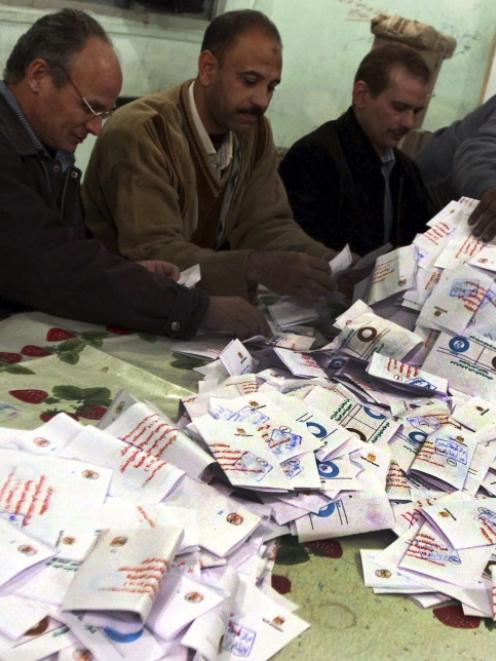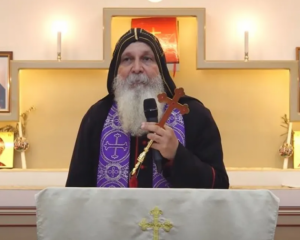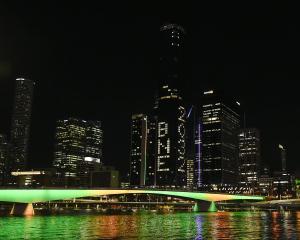
President Mohamed Mursi sees the basic law, drawn up mostly by his Islamist allies, as a vital step in Egypt's transition to democracy almost two years after the fall of military-backed strongman Hosni Mubarak.
Unofficial tallies from the Muslim Brotherhood - which catapulted Mursi into the presidency this year - indicated that 64 percent had approved the charter, although an official result was not expected until at least Tuesday (local time). An opposition tally had a similar result.
Mursi's critics said the vote, conducted in two stages in a process that ended on Saturday, had been marred by a litany of irregularities, and have demanded a full inquiry.
"The committee is currently compiling results from the first and second phase and votes from Egyptians abroad, and is investigating complaints," Judge Mahmoud Abu Shousha, a member of the committee, told Reuters.
Two sources in the committee said the results were likely to be announced on Tuesday.
"It will not be very different from the unofficial result, at 60-something percent," one said.
The opposition, a loose alliance of socialists, liberal-minded Muslims and Christians, say the text is too Islamist, ignores the rights of minorities and represents a recipe for more trouble in the most populous Arab nation. They have noted that less than a third of those eligible turned out to vote.
Election looms
If the "yes" vote is confirmed, a parliamentary election will follow in about two months, setting the stage for Islamists to renew their battle with more secular-minded opponents.
Opposition politician Mohamed ElBaradei, a Nobel peace prize winner, urged Mursi to form an all-inclusive government together with the liberal camp in order to patch up divisions and steer Egypt out of trouble in a democratic way.
"I am ready to join hands with President Mursi on condition that he forms a national (unity) government and speaks as president for all Egyptians," he told the daily Al-Shorouk.
ElBaradei, the former head of the U.N. nuclear agency, said a new assembly should rewrite the draft - a call unlikely to be heeded by Mursi, who is keen to push it through quickly.
By forcing the pace on the constitution, Mursi risks squandering the opportunity to build consensus for the austerity measures desperately needed to kick-start an ailing economy, economists say.
Highlighting investor concerns, Standard and Poor's cut Egypt's long-term credit rating and said another cut was possible if political turbulence worsened.
Responding to what it said were market rumours, the central bank said it was taking steps to safeguard bank deposits.
Some Egyptians say they have withdrawn their funds from banks out of concern that they will be frozen by authorities.
Legislative powers
Under the new constitution, legislative powers that have been temporarily held by Mursi move to the Islamist-dominated upper house of parliament until a new lower house is elected.
The make-up of the Supreme Constitutional Court, which Islamists say is filled with Mubarak-era appointees bent on throwing up legal challenges to Mursi's rule, will also change as its membership is cut to 11 from 18.
Those expected to leave include Tahani al-Gebali, who has described Mursi as an "illegitimate president".
The low turnout has prompted some newspapers to question how much support the charter really had, with opponents saying Mursi lost the vote in much of the capital.
"The referendum battle has ended, and the war over the constitution's legitimacy has begun," Al-Shorouk wrote in a headline, while a headline in the Al-Masry Al-Youm newspaper read: "Constitution of the minority".
The head of the Muslim Brotherhood's Freedom and Justice Party, Saad al-Katatni, wrote on Facebook that the group's members were "extending our hands to all political parties and all national forces", adding: "We will all start a new page".
But the opposition National Salvation Front say the new basic law only deepens a rift between the liberals and Islamists who combined to overthrow Mubarak, and that they will keep challenging it through protests and other democratic means.
"We do not consider this constitution legitimate," liberal politician Amr Hamzawy said on Sunday, arguing that it violated personal freedoms.
The run-up to the referendum was marred by protests triggered by Mursi's decision to award himself broad powers on Nov. 22. At least eight people were killed in clashes in Cairo and violence also flared in the second city, Alexandria.












